#peter gimbel
Explore tagged Tumblr posts
Text

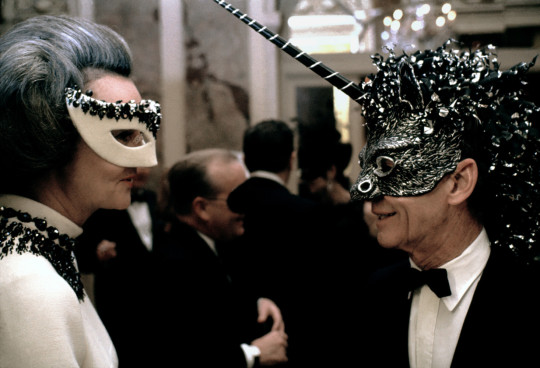



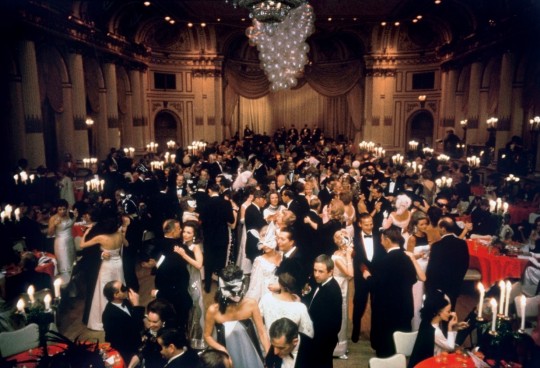
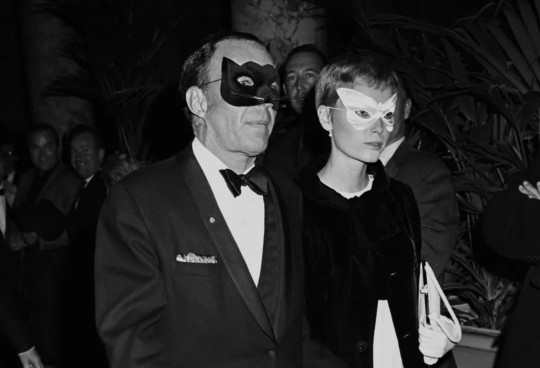
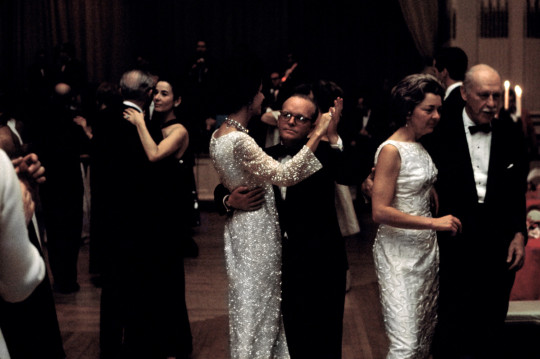

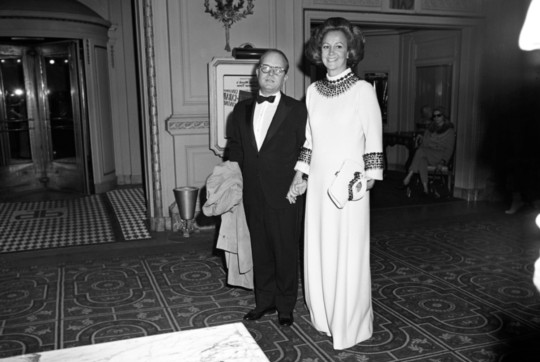

Truman Capote's infamous Black and White Ball at New York’s Plaza Hotel on November 28th 1966. The masked ball which was labeled the "party of the century", was thrown in the honor of his dear friend Katharine Graham, whose husband died by suicide in 1961, leaving her to run the family media empire. The guest list contained 540 of his closest friends from affluent families, royalty, fashion designers, models, actors, writers, musicians and his famous "Swans".
Photos: 1. Capote with his favourite "swan" Lee Radziwill, 2. Interior designer Billy Baldwin (pictured on the right) with a fellow guest. 3. Princess Luciana Pignatelli, Peter Gimbel and Contessa Consuelo Crespi. 4. Capote chatting with guests. 5. Françoise de Langlade and Oscar de la Renta. 6. Guests dancing. 7. Frank Sinatra and Mia Farrow. 8. Capote dancing with "swan" Gloria Guinness. 9. Candice Bergen dancing with a guest. 10. Capote with guest-of-honor Katharine Graham. 11. Truman socializing with guests.
#truman capote#black and white ball#1966#lee radziwill#billy baldwin#luciana pignatelli#peter gimbel#consuelo crespi#françoise de langlade#oscar de la renta#frank sinatra#mia farrow#gloria guinness#candice bergen#katharine graham#style#fashion#1960s
182 notes
·
View notes
Text
I know that like any very popular story there are all kinds of claims and counter-claims about whether X inspired Y part of Jaws, but did Peter Benchley ever actually say that Matt Hooper was based on Peter Gimbel or is it just assumed because the book DID take inspiration from Blue Water, White Death and the movie even used the same underwater camerapeople and the oceanographer randomly being an heir to a fortune would be a strange plot element otherwise?
1 note
·
View note
Text
hello. I give you a list of some of my mom's top favorite christmas movies (also some of my own top favs!!) that you should definitely watch if you get the time!!
fitzwilly (1967) -- dick van dyke frequently commits capers so the woman he works for never realizes she's poor -- and also because, he just really loves doing it. he must pull off his final caper to set everything right on christmas eve, in the hallowed gimbels department store. a great cast of character actors in this, including john mcgiver and john fiedler (the voice of piglet!!)
the man who came to dinner (1942) -- the incredible monty woolley, playing an acerbic, egotistical radio host, slips on some icy steps, gets stuck in a house while recovering from the subsequent broken hip, and causes Massive Seasonal Havoc for literally every single person alive. literally the most incredible dialogue you will ever, ever hear, with the most perfect cast to ever come together
the shop around the corner (1940) -- the og you've got mail, with james stewart and margaret sullavan playing the feuding coworkers unknowingly in love with each other (i prefer in the good old summertime (1949), the musical version with judy garland and van johnson (and s.z. sakall!! and buster keaton!!) (and still christmasy, despite the title!!), but! I think we should all see shop around the corner at least once. ernst lubitsch, you know.)
larceny inc (1942) -- edward g robinson parodies his gangster roles in the classic con tale of "recently-released criminal buys store near bank in order to tunnel into the safe". if you've seen edward g play it completely serious in like, double indemnity, PLEASE watch larceny inc, he truly has some of the most incredible comedic delivery ever, as do edward brophy and broderick crawford, also some classic noir and gangster actors having the time of their lives being silly
we're no angels (1955) -- humphrey bogart, peter ustinov, and aldo ray (eric da re's father!!) play escaped criminals who intend to rob a store but end up helping the family who runs it keep it out of the hands of their conniving relative, played by basil rathbone. it can be a little slow but is honestly, very sweet, a little absurd, a little dark comedy, just such a time all around
christmas in connecticut (1945) -- the most Shenanigans to EVER shenanigan. barbara stanwyck plays a magazine writer who's been lying about her life in order to keep her job and write a homesteading column. she cannot cook, or farm, and is not even married. her editor (sydney greenstreet!!) has a recovering soldier come stay at her (unbeknownst to him, actually nonexistent) farm to experience good christmas feeling. Cue The Most Zany Series Of Shenanigans To Keep Up An Absolute Mountain Of Lies
#This Is A Household Built On Revering The 1940s Shenanigans Movies#would anyone......maybe be interested........if i like..........streamed one of them or something...........mayhaps..............#......how does one.......stream......for people..........
90 notes
·
View notes
Text
Goodbye Grey Sky, Hello Blue - 30

Summary: In an alternate universe where trains and zeppelins are still common forms of travel and the internet and cell phones exist, nineteen year old Peter Parker has few options left after he’s swindled out of his inheritance. Unable to pay for college, let alone keep the house left to him by his deceased aunt, he’s running out of time before he’s out on the streets. Desperate, Peter signs his life over to the Bureau of Civic Spousal Selections to take his chances as the selected husband of a complete stranger. After all, he only has to make it through a year and then he can choose to annul.
Dr. Stephen Strange has little interest in marriage, preferring to focus on his career. When his career is threatened by what a nosy board of directors considers a “lack of personal fulfillment and settling down,” he opts to select a spouse through the BCSS and chooses Peter Parker. The young man’s profile he’d briefly skimmed suggests intelligence and compatibility. It’s not ideal, but if after a year it’s not working out, he can always annul the marriage and send Peter on his way.
It’s a marriage neither truly wants, with sharp learning curves for both. It’s either going to be forever or it’s going to go down in flames.
Warnings/AO3 Tags: 18+ MINORS DNI, Alternate Universe, Alternate Universe - 1950s/Modern Fusion, Doctor Stephen Strange, Jewish Peter Parker, Peter Parker is an Adult, Marriage of Convenience, Marriage Contracts, Government Sanctioned Marriages, Domestic Discipline, Dubiously Consensual Spanking, Spanking, Aftercare, Mildly Dubious Consent, Dubious Morals, Dubious Ethics, Asshole Stephen Strange, Smartass Peter Parker, Passive Aggressive Canned Soup, Two Morons Trying to Try Their Best, Borrowing Characters

_______
Chapter 30
_______
They didn't go to Grand Orleans due to forecasts of bad weather, but they did drive the three hours to Upper Manhattan for an extended weekend.
Thursday afternoon found them checking into a fancy hotel. Stephen suggested they rest for a few hours in their room before going down to the Grand Salon for dinner. It didn't surprise Peter in the slightest that "resting" really meant sex and he enjoyed the novelty of being thoroughly debauched in a hotel room with a king bed and a stunning view of the city.
The Grand Salon was a marvel of crystal-like curtains and glowing chandeliers that complemented the rich wallpaper, lush velvet and silk seating. He'd never been in such an elegant, refined place. Everyone was dressed in fine clothes and for once, Peter felt like he belonged thanks to his tailored suit and the reading he'd done on etiquette and fine dining.
"Do you want to see the prices on the menu or would you like me to order for you?" Stephen asked once they were seated and he was handed the day's menu. "I think I have a fairly good idea of what you'll enjoy."
"Please," Peter said, relieved. There was no way their dinner would be anything other than outrageously expensive and he'd rather not have to worry about the cost.
Stephen ordered them both a Cardini salad, baked salmon with squash, spinach, and scallions in a rich beurre blanc, and glazed roasted carrots. He even ordered panna cotta for dessert. Everything was delicious and it was the most exquisite meal Peter had ever had.
"Well?" Stephen prompted as Peter finished his last bite of the vanilla custard topped with a blueberry compote and side of lavender ice cream.
"Rich people might be on to something, food-wise," he admitted. "Thank you."
"It's my pleasure."

Stephen replaced Peter's battered luggage with a new set during a trip to Gimbels the next morning.
"I already have luggage!" Peter protested.
"Yes, and it's falling apart," Stephen said, unimpressed. "You might keep in mind that the set you arrived with is, by your own admission, older than you. It was well used and has served its purpose."
Peter couldn't argue with that. Stephen's gift was a nice set and would no doubt last him for a decade or two.
Gimbels was only the tip of the ice burg. Stephen guided him into L.S. Ayres and he spent a few hours being measured and and given a selection of clothing better suited to warmer temperatures to try on. There was little point in protesting; he needed clothes for spring and summer and he'd put on a few inches of muscle in addition to a few pounds since the previous August - one of the benefits of having steady, nutritious meals for months on end.
And, he had to admit, Stephen's taste was impeccable. Peter looked so far removed from the gangly, underfed boy hailing from Midtown... but he also looked like himself.
"Thanks for all the clothes," Peter said while they ate lunch at the L.S. Ayres tea room. It was a nice place, clearly designed to keep shoppers from leaving the department store for lunch. He enjoyed watching the small group of men and women walking around modeling the latest fashions.
"You're welcome," Stephen said. "You can't exactly be running around Malibu in long-sleeves."

That evening, Stephen surprised him with attending a show in Upper Manhattan's famed theatre district. Peter had never seen such a spectacle but he thoroughly enjoyed the music, dancing, and clever humor of The Music Man.
"I've seen community plays before," Peter told Stephen that night after they returned to their hotel room. "But nothing like that! I think I liked it more than the movies I've seen!"
Saturday morning they decided to spend the day out. He enjoyed exploring a city he'd only been to as a young child and even when they passed near Columbia University, Peter's mood didn't drop. That wasn't his life anymore and the one he had now was turning out to be a good one.
They didn't go to another show on Saturday evening, but Stephen took him to see a movie where they ate hot buttered popcorn and washed it down with fountain sodas.
"You said you've seen movies before?" He asked as the taxi drove them back to their hotel.
Peter nodded. "There was a dollar theater at the very edge of Midtown - the farthest the street trolley would travel. Every movie they showed was a few years old and I only managed to see a few, but I liked them." He considered for a moment. "I prefer radio shows, though. I like having pictures of what everything looks like in my mind and not shown."
"I feel the same way," Stephen agreed.
On Sunday they lazed in bed and barely made the cut-off to order in-room breakfast. They took their time packing and checking out before Stephen drove them back home.
"Have you done this often?" Peter asked as they drove. "Just take off for a long weekend?"
"Maybe once or twice every other year," Stephen said. "I have the amount of vacation time I have banked for a reason. The few times I've been asked to assist in a surgery like the one last autumn I would stay and enjoy a day or two if the city was interesting."
"But you didn't last time. You came home as soon as you could."
Stephen briefly looked over at him. "I had a reason to want to be home."

Work was more or less peaceful now that everyone on the hospital's board had met Peter and observed the two of them together. They'd hosted another dinner for an important pair of donors to the hospital and Peter had them charmed before the appetizers (his famous walnut date bites with coconut whip and sweet potato stacks) were even touched. It almost seemed too good to be true.
It was.
One Wednesday morning a week before his trip with Peter to California, Reed Richards came to his office and asked to speak with him.
"How may I help you?" Stephen asked.
Reed sat. "I very much enjoyed meeting your husband."
He said nothing.
"He's a fine young man and so gifted. I don't want to sound as though I'm bragging but there aren't many people I can talk about oncology, feature scoring, and bio-markers with. Peter kept up without a pause."
"He's a smart young man," Stephen agreed.
"And I can't help but wonder if his potential is being squandered. He was chosen to write for Van Dyne," Reed continued. "If his theories proved true, he could have revolutionized wound care. Stephen, he needs to be in college, not playing house husband."
"What are you really getting at?" Stephen asked. He had an idea, of course, and he could feel his temper rising.
"Your year with the BCSS is up in August. Stephen, I really think the right thing for you to do would be to annul the marriage. Peter had such a bright future ahead of him and keeping him chained to you isn't fair to him. Like I've said, a young man like him should be in college and making his mark on the world."
"Get out."
"Stephen-"
"No. All this song and dance about how you and the others just want me to be happy and now that you've seen I am, you want it destroyed. I'm so sorry I didn't follow your groupthink and ignore a fellow doctor's egregious malpractice, but just because I actually have a code of ethics I follow doesn't mean you get to make my life miserable to assuage your own guilt. Get out."
Reluctantly, Reed left with a parting "At least consider it."
Stephen managed to keep from throwing something, but only just.
The rest of his day passed in a haze and worst of all was the sinking feeling in his stomach.
Richards, damn the man, was probably right.

Peter could tell something was wrong when Stephen came home.
Stephen didn't acknowledge his greeting but went upstairs to change. When he came down it was as if he were going through the motions of a pleasant meal and evening in. It stung a little, considering the effort Peter had put into making the beef Wellington. It was a new attempt, and he'd hoped for even a small amount of praise.
"Did something happen at work?" Peter asked after Stephen bit into a lemon bar.
"Just a colleague speaking out of turn," Stephen said finally. "I'm sorry I'm such poor company at the moment."
"Was it anyone I know?"
"Yes, but what that person said hardly merits repeating," Stephen said. "Don't trouble yourself with it."
"If you say so," Peter said.
"I do say so," Stephen said sharply. He closed his eyes and sighed. "I'm sorry. Just... don't worry about it."
"Stephen... if I've done something wrong, you can tell me."
"Not everything is about you, Peter," Stephen said.
Peter could only stare as Stephen got up and went upstairs. He listened carefully and heard the door to Stephen's office close.
What on earth was going on?
Stephen hadn't been this much of an asshole in months.

Talking with Tony and Sharon helped, at least.
He finalized plans to visit along with Peter and after Tony had to leave for an important SI meeting, Sharon assured Stephen that he'd be able to meet with two of her former colleagues who had a stake in the Quentin Beck case.
"It's kind of funny, though, isn't?" she wondered aloud while they were nailing down details.
"What is?"
"That Peter grew up so poor but somehow had an inheritance to be swindled out of."
He'd wondered about that himself, but there never seemed to be a reason to confront Peter over it. As far as Peter was aware, Stephen knew nothing about Quentin Beck or what had driven him to sign his life over to the BCSS. He'd hoped that Peter would trust him enough to talk to him about it, but apparently Peter didn't think it was necessary.
"A question for the ages," Stephen said.
"Johnson sent me some details and it looks like Beck deposited a hundred and fifty thousand around the time he vanished from Midtown, New Amsterdam."
All things considered, it wasn't exactly a glowing inheritance. Enough to let Peter keep his house and attend college for four years, but after that? Hardly anything to write home about.
Stephen made more than that in a quarter.
It was no wonder Peter thought Stephen's habits were wasteful and still preferred to save money when buying food and household items.
"Is something else going on?" Sharon asked. "You sound different."
He sighed. One of the problems with having friends was that even if those friends weren't former spies and trained interrogators, eventually they'd know someone well enough to know when something was off.
"It's something better discussed in person," he hedged.
"You'd better plan on discussing it when you two get here, then," she warned. "Bottling things up isn't going to help anyone."
"Says the woman who kept secrets for a living," he shot back.
Sharon laughed. "Oh, that wasn't even the half of it! Listen, Tony's spawn is playing football with my internal organs so I'm going to go lie down. I'll talk to you later, alright?"
"Take care of yourself," he urged.

Peter was withdrawn that night and everything about his body language - and the fact that he was wearing pajamas - said "back off."
Hating that he'd hurt Peter, Stephen did back off and dressed for bed himself.
"I'm sorry for snapping at you earlier this evening," Stephen said after he'd joined Peter in bed. "You didn't deserve to be spoken to that way."
"No, I didn't," Peter said finally, still not looking at him. "I'm your spouse, not your verbal whipping boy."
"I'm sorry I made you feel that way."
"I don't ask about your day or what's bothering you to be nosy. I ask because you shouldn't have to deal with it alone."
"That's something I'm still coming to terms with," Stephen said. "I've been alone for a very long time."
"You're not, now. I know I'm not much-"
Stephen pulled him close and kissed him. "You're everything. I'm sorry I haven't made you feel that way. I'm... I'm glad that I have you."
Peter returned the kiss, pushing Stephen onto his back. "You have me." He kissed him again, started unbuttoning Stephen's pajama shirt, and then began to kiss down. And down.
"Peter, you don't-"
Peter looked up, amused. "I know." He continued his attentions downward and Stephen lifted his hips so Peter could pull clothing off.
Few things could make his mind go blissfully blank. Peter's mouth around his cock was one of them.
After he'd cleaned them up and before he fell asleep, Stephen vaguely wondered if Peter had any notion of the amount of power he could wield over him.

Peter took a deep breath before knocking on the door.
The woman who answered smiled delightedly when she saw him. "Peter! How wonderful to see you!"
"I'm sorry to bother you on your day off, Sue," he said.
"Oh, not at all! I was just using the quiet to do some cleaning. Franklin and Valeria will just mess it up again when they return from day care, but needs must. What brings you by?"
"I was hoping you could pass on a message to Dr. Richards for me."
Sue nodded, still smiling. "Of course! What would you like for me to tell him?"
"I'd like for for him to keep his opinions on my marriage to himself. He might not approve of how I'm living my life but it's my life. Stephen is my selecting spouse and I don't like seeing him upset."
Her smile faltered just a bit and she closed her eyes, mouthing something that sounded like "that man". She didn't look surprised at all. "Of course, I'll tell him."
"I would really appreciate it," Peter said. "I'm sorry to have to even ask, but like I said, I don't like seeing Stephen upset."
She nodded. "I'm so sorry you've had to deal with this. Reed so often has very good intentions but his execution and inability to let things go can cause problems."
They exchanged a few minutes of small talk and then Peter returned home.
Hopefully, that would be the last of it.
_______
#couldntbedamned fic#spiderstrange#spideystrange#stephen strange x peter parker#peter parker x stephen strange#1950s modern fusion au#1950s au#read the fucking tags and warnings#no seriously read them#peter parker#stephen strange
7 notes
·
View notes
Text
youtube
Backroll & Roll To Revert Invert Wakeboard Tutorial In diesem Video werden sowohl die Backroll als auch die Roll to Revert erklärt, die für viele die ersten Inverts überhaupt sind. Ebenso wird erklärt wie die Backroll Switch bzw. nach innen funktioniert. https://ift.tt/bD213sR https://ift.tt/9BwPxWm Location: Wasserki und Wakeboardzentrum Heuchelheim https://ift.tt/xJ58NeB https://ift.tt/gePcfXl Photographer: Peter Gimbel https://ift.tt/eqa9m7r Support: Mark Schauer http://www.youtube.com/doppelhut https://ift.tt/Efpojix https://ift.tt/Srq2fTM https://ift.tt/X9Zw6rO Special Thanks: Marvin Beer, Jakob Boll, Florian König, Felix Kunold Disclaimer/Haftungsausschluss Solltet Ihr die hier erklärten Tricks selber probieren, tragt immer einen passenden Schutzhelm sowie eine Prallschutzweste die für eure Größe und euer Gewicht geeignet sind. Versucht nur Tricks, speziell auf Obstacles die eurem Fahrlevel und eurem können entsprechen. Wärmt euch vor dem Fahren immer gut auf um Verletzungen vorzubeugen. Solltet Ihr einen neuen Trick versuchen, tut dies in einem Bereich der von anderen Personen eingesehen werden kann. Informiert anderen Personen oder das Seilbahnpersonal bevor Ihr einen neuen Trick versucht. Die hier gezeigten Tricks und Tutorials sind lediglich eine Hilfestellung. Ich übernehme keinerlei Verantwortung für Verletzungen, Sachschäden oder Personenschäden die beim trainieren entstehen. Die Ausführung oder Nachahmungen von Übungen oder Inhalten aus diesem Video erfolgt auf eigene Verantwortung und unter Ausschluss jeglicher, insbesondere zivilrechtlicher, Ersatzansprüche gegen den Ersteller im Zusammenhang mit den dargestellten Inhalten. via YouTube https://www.youtube.com/watch?v=QY8-IQtjfGA
0 notes
Text
Elf (2003)
Smoking: Graffiti
Hands down my favorite Will Ferrell movie. And in honor of the season here we are 😊
Definitely a lot of product placement in this movie. Which if you don’t know is a Marketing term and how a lot of movies and tv shows make money to support their creation. We had Bob the Builder doll, Mr. Potato Head, Barbie and Etch-a-Sketch all with in the first 3 minutes of the movies. Wonder how much they paid for that 🤔
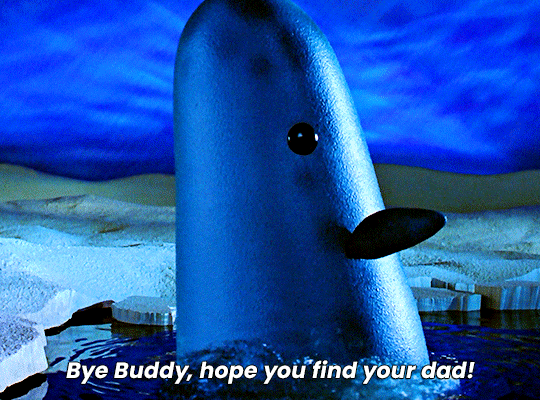
We have poor little Orphan Buddy who sees a teddy and decides to go for a late-night crawl and ends up traveling around the world and ends up back at the North Pole.
We have the wonderful Bob Newhart playing his adoptive father. When they are in class, I don’t understand why he’s in the front row. He’s so tall, he can see from the back, I’m sure.
I totally say Cotton-Headed-Ninny-Muggins in a good number of conversations. I would hate to be the Jack in the Box toy tester. Talk about ANXIETY!!!!

I wonder how much back and neck pain doing all of these scenes with having to hunch down. I like how they have some of the characters based off of the old Rudolf Claymation movie.

How is his outfit able to keep him that warm? I mean he traveled through the snow-covered mountains; you know that shits cold, and he’s got on leggings and an elf hat. It’s not free candy!!! 🤢
Meeting his father. James Caan, for the first time. Christmas Gram time! His awkward song “Guess what? I love you, I love you, I love you”
I love watching him go up the elevator 😂 "it's a Christmas Tree"
Enter the love interest, Zooey Deschanel. “Best way to spread Christmas Cheer, is to sing loud for all to hear.”

I love that Mary Steenburgen is in this movie. She is also in another one of my favorite WF movies, Step Brothers. “You can call me night hawk.” Tell me why his name tag says Wanda, but in the line up on IMDB he’s named, Gimbel’s Manager 🤔 wonder if it was a recast at the last minute?
Faizon Love is another of my favorites. But from a totally different movie. The Replacements. Probably the only football movie I like.
The gif I use the most is “You sit on a thrown of lies.” Mainly to my friend Heather 🤣 when I’m teasing her about something. Or calling her a cheater because of a card game 😂

I wonder how that candy spaghetti tasted. I half want to try it and half want to throw up 🤢

I swear he has some kind of ADD, maybe its all that sugar 🤣
There is NO WAY Mark Acheson was 26 years old at the time of this 😂 he looks like he’s at least 40 something.
Enter Peter Dinklage, “the elf” that’s too far from the North Pole for WF. I love when he climbs on the table and just attacks him 🤣

Make the Buddy sighting seem like he’s bigfoot 😂 I swear this movie ☠️
And what saves the day? None other than ZD “the best way to spread Christmas Cheer is singing loud for all to hear.”
And here’s the end of the movie. Thanks for reading this weeks.

Happy Holidays!
Toke on!
-RRR
#will ferrell#bob newhart#james caan#zooey deschanel#mary steenburgen#faizon love#mark acheson#peter dinklage
1 note
·
View note
Photo
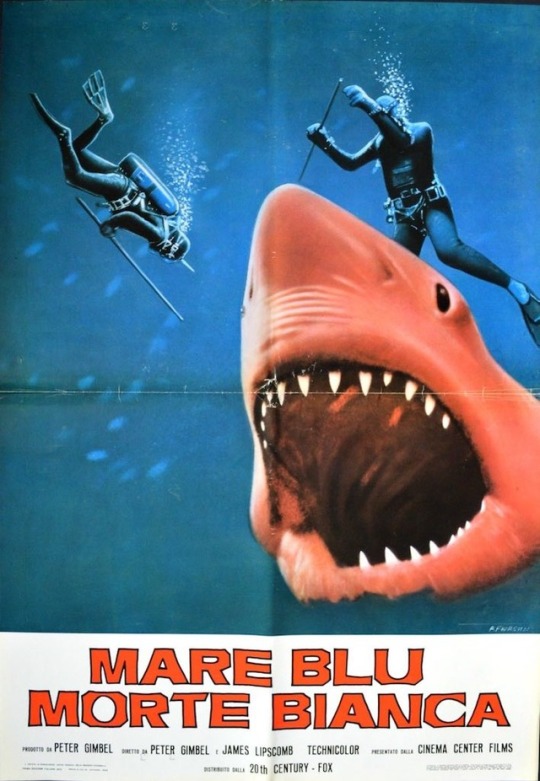
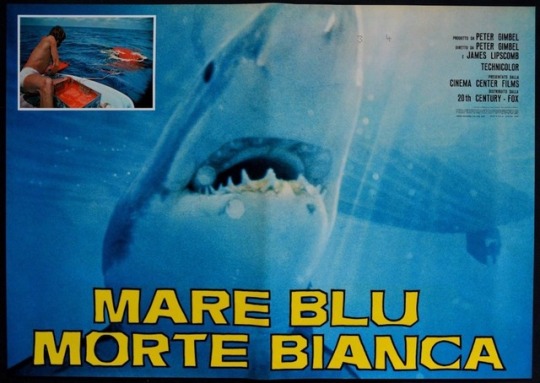
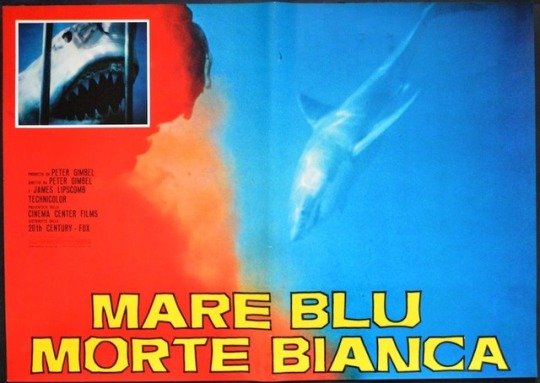
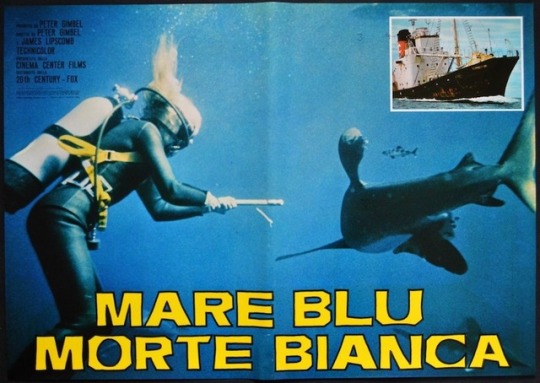


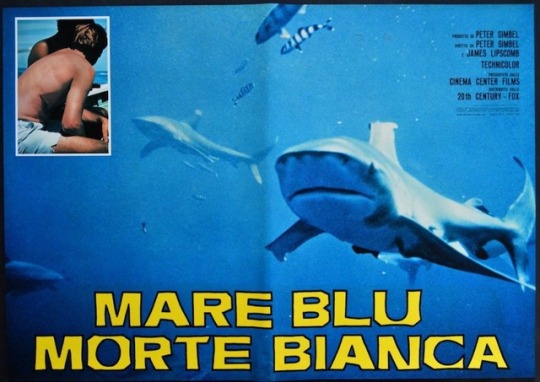


BLUE WATER WHITE DEATH (1971) - JAWS: SHARKS IN MOVIES (Part 3/10)
Before Jaws was such a huge success, sharks always captivated us especially Great white sharks which were the basis of the1971 US underwater scuba documentary, one of the best ever made. here’s the Italian poster as well as the complete rare set of 8 Italian fotobusta posters.
Director: Peter Gimbel Actors: Tom Chapin
All our SHARK movie posters are here
If you like this entry, check the other 9 parts of this week’s Blog as well as our Blog Archives and all our NEW POSTERS
All our ON SALE posters are here
The posters above courtesy of ILLUSTRACTION GALLERY
#illustraction gallery#illustraction#blue water white death#Mare blu morte bianca#shark movies#shark movie#Great white shark#film#Peter Gimbel#Scuba diving#Jaws#movies#Movie Poster#documentary#1971#Italian movie poster#fotobusta#photobusta#vintage
2 notes
·
View notes
Photo

I was able to get hold of the documentary “Blue Water White Death”, the movie that inspired Peter Benchley and Spielberg’s “Jaws”.
The hunt for the carcharodon carcharias happened in 1969 when research into the T-rex of the sharks by marine biologists was non-existent. Some people had been bitten by great white sharks but nobody knew where this animal could be seen, photographed and studied.
The 6-month expedition was financed by Peter Gimbel, the American heir of a chain of department stores.
Another crew member had previously been mauled by a great white; you cannot believe he survived that encounter when you see the photos!
But the real heroes of the movie are the Australian couple Ron and Valerie Taylor.
(They later shot second-unit footage that was used in “Jaws”. Spielberg changed the ending of “Jaws” because of it: in the screenplay, marine biologist Matt Hooper (Richard Dreyfus) didn’t make it.)
This expedition pioneered many things we now take for granted because we’ve all seen “Jaws”: shark cages for divers, the idea to attract sharks with “chum” (buckets of bloody fishing bait), harpooning sharks with a poisonous spear as last resort etc.
https://www.instagram.com/p/B6pxF3GjUeO/?igshid=pegh0bfslyvk
#jaws#steven spielberg#spielberg#sharktank#sharkweek#shark attach#ron taylor#valerie taylor#peter gimbel#documentary#dvds#dvd#dvd collection#dvd collector#expedition#marine biology#movie#movies#film#films#shark lover#shark diving#shark movie#great white shark#great white#nature#sea
0 notes
Photo

Black And White ‘66.
Principessa Luciana Pignatelli, Peter Gimbel, and Contessa Crespi.
71 notes
·
View notes
Photo

Valerie Taylor at Europa in the Mozambique Channel, 1969. "In 1969 Peter Matthiessen set out with the expedition led by Peter Gimbel, whose aim was to find and film underwater for the first time the most dangerous of all sea creatures - the great white shark. Acting as the expedition's chronicler Matthiessen accompanied the crew from the Caribbean to the Durban coast, to various islands in the Indian Ocean, to Ceylon, and finally to success off the bleak south coast of Australia. Blue Meridian records the awesome experience of swimming in open water among hundreds of sharks, the beauties of strange seas and landscapes and the camaraderie, humour and tension of people who live in close proximity and risk their lives day by day." From"Blue meridian; the search for the great white shark" byPeter Matthiessen, 1971. https://www.instagram.com/p/ChK6vQ5tafs/?igshid=NGJjMDIxMWI=
114 notes
·
View notes
Note
So, some sharks may also bump their noses into something they may want to eat, a few times. This is less of a curiosity thing and more of a "I'm making sure this big thing I want to eat is dead."
Valarie Taylor et al. saw this behavior with a school of oceanic white-tip sharks, (Carcharhinus longimanus) who had gathered to feed on a wounded and dead whale that Valerie's crew had killed to try and attract a white shark (Carcharodon Carcharius) for the documentary they were filming under Peter Gimbel (the documentary was called Blue Water, White Death and it was released in 1971. It preceded Jaws). The sharks would bump into the whale carcass a few times before taking a bite. Valeria et al. surmised that if the sharks bumped them, they should bump back to say "I'm not food." They left the shark cages they were supposed to use for filming and shared the water with the shark.
And it worked! Bumping the sharks back gave them a mutual respect for each other and the sharks left them alone while they fed on the whale.
It probably doesn't feel good to get punched unexpectedly in the nose, no matter what you are, haha. The nose of a shark is sensitive, so a bap is a good deterrent if you don't want a curious shark snooping about.
Sadly, you'll never see a school of Carcharhinus longimanus like the one Valarie swam with. Bycatch from industrial fishing and commercial shark finning have decimated Thier population, as with so many sharks like them.
If you watch Blue Water, White Death or Playing With Sharks: The Valarie Taylor Story, you can see that footage.
Wow!!! Hi!!!! This is an awesome response, thank you so much for putting the time in!!!! 🤩 this is probably one of the coolest asks I’ve ever gotten, and I will definitely look into these documentaries!!!
When I reblogged your post I actually debated about putting something about how, after all that info, I actually felt conflicted about hitting a shark in the nose 😭 even in self-defense. I’m glad there’s something else that’ll hopefully work!
Thank you again for reaching out! It’s honestly, like. Not to be a big goober, but seeing people be so passionate about things, enough to reach out to a total stranger — it’s very touching. So thank you. Have a lovely day! ❤️🦈
Edit: the post in question that the asker is referencing!
#asks#answered#sharks#Kim is Icarus#just so I can find this again#because this is really neat! definitely one of my favorite asks I’ve received for sure#I need to work on my fear of sharks. I know it’s a culturally ingrained thing#they’re wild animals. I wouldn’t fault a bear for doing bear things#logically I know that sharks are the same; realistically I’ve been exposed to too many ~shock and horror~ shark stories#to jump to ‘’they’re just vibing’’ naturally#but it’s something that can be done! and sharks deserve better because they aren’t malicious. just animals.#anyway I’ve rambled too much but mayhaps I will devote today to these documentaries!
11 notes
·
View notes
Video
youtube
Ambrosia - How Much I Feel HD HOWS UR LIFE BEEN GOING ON"??>WELL< SINCE U ASKED< DAVID PACK<HERE GOES: TODAYS UPDATE: ((8/23/210= "SHE DID NOT CARE(OR FOR LONG& HER PARENTS DESPISED ME< A WELL DRESSED< SEMI HIPPIE> WHEN WORKING SUPR> AT GIMBELS MENS GROUP(ROOSEVELT FIELD, GARDEN CITY(PETER GIMBELS ACCLAIMED " BLUE WATER, WHITE DEATH< THE SEARCH FOR THE GREAT WHITE SHARK DOCUMENTARY FLICK""}} OVER 5 YRS>P/T WHILE ATTENDING " HOFSTRA U>))LOVE ME FOR TOO LONG(ABOUT 2 YRS<(SHE GAVE HERSELF TOO)>POSSIBLY THE "REVERSE OF WHAT SO MANY " GUYS" DO"> ANYWAY< MY LOVE GREW LIKE " STEVE MCQUEENS NEMESIS IN THE ORIGINAL " THE BLOB" FLICK(NOTE+ DID NOT< "{DISCLAIMER HERE}} " CONSUME HUMANS.ANIMALS & JUST GAVE UP " BROCCOLI"(REAL POISONOUS "CANCEROUS SPRAY GOING ON IT & LEAFY VEGGIES(CAUSE_EX AS*H*LE PREZ EXEC ORDER> FRUIT OF THE LOOM(NOT THE UNDER WEAR}} & THE EX< AGAIN & AGAIN????}(THIS WAS B$ DAD ENLARGED HIS HOUSE( A SUPERB ENGINEER & MASTER OF MOST TRADES) ADDED @ CAR GARAGE, WOOD PANELED INTERIOR<ETC>(ALL WHILE I WAS EITHER PLAYING TENOR SAX UPSTAIRS< OFF DEEP SEA SCUBA WRECK DIVING< DATING 1ST LOVE OF MY LIFE< "LADY DIANE"(TO ME=YOUNG SMART<BEAUTIFUL< NO MAKEUP EXCEPT AT WORK(GIMBELS FINE DRESS DEPT< AND< YES< MOST STUNNING WOMEN" AT MY LATE(11/2020 ) BROTHERS WEDDING(SHE ALREADY BROKEN US UP IN FEBRUARY< STILL< I ASKED< SHE WENT THERE(TOO MANY RELATIVES CAME OVER THE TABLE TO SPECULATE< CONGRATULATE OUR ALREADY IN THEIR MINDS EMINENT WEDDING)(EXCEPT FOR "BRIDE/GROOM & MY PARENTS< STILL HIDDEN SECRET>WORK(GIMBELS FINE DRESS DEPT< AND< YES< MOST STUNNING WOMEN" AY MY Steve Eckstein
1 note
·
View note
Note
Leaf: I would like to learn more about the fae, could you tell me where a good place to start would be? maybe book recommendations? or specific fairy tales to look into? thank you so much
Ah, welcome. It is always good to see those who wish to broaden their knowledge of the old stories.As to the Fae, it depends on what you’re looking for. You see, the Folk did not arise from a singular instance of Mythology, but from an amalgamation of many cultural traditions and stories. For Ireland we have the Tuatha de Danann and their battles against the Fir Bolg and eventually become the Aos Sidhe. There are the Welsh Tylwyth Teg who steal fair haired children from their beds and leave changelings in their place.The Scottish hold great pride in their Seelie and Unseelie courts, while the Scandinavian people whisper fearfully of Trolls, Gnomes, Shapeshifters, Wights, and Werewolves.Will you look to the Norse for stories of Light Elfs, Dwarfs, and Disir? Or to the Germanic Wichtlein who aided miners, and are one of the distant precursors to both the Goblins and Dwarfs we imagine today?Or would you prefer to move forward to the Victorian age where Fae were brought together to diminutive sprites and fanciful little magics that you might find in Peter Pan, A Midsummer Night’s Dream, or the Faerie Queene?It really depends on what you’re trying to find. The Lore of the Fae is vast and encompasses the traditions of many different European cultures, each unique and important in its own way. I can include below a full list of all the sources I happen to possess at this time. Hopefully they will grant your desire of providing an excellent place with which to begin your research.
Kirk, Robert. The Secret Commonwealth of Elves, Fauns, and Fairies. 1691. Reprint, London: D. Nutt, 1893.
Wilby, Emma. “The Witch's Familiar and the Fairy in Early Modern England and Scotland.” Folklore, vol. 111, no. 2, 2000, pp. 283–305. JSTOR, JSTOR, www.jstor.org/stable/1260607.
Vejvoda, Kathleen. “‘Too Much Knowledge of the Other World’: Women and Nineteenth-Century Irish Folktales.” Victorian Literature and Culture, vol. 32, no. 1, 2004, pp. 41–61. JSTOR, JSTOR, www.jstor.org/stable/25058651.
Nutt, Alfred. “Presidential Address. Britain and Folklore.” Folklore, vol. 10, no. 1, 1899, pp. 71–86. JSTOR, JSTOR, www.jstor.org/stable/1253611.
Goodare, Julian. “The Cult of the Seely Wights in Scotland.” Folklore, vol. 123, no. 2, 2012, pp. 198–219., www.jstor.org/stable/41721541.
Briggs, Katharine Mary (1976). "Euphemistic names for fairies". An Encyclopedia of Fairies. New York: Pantheon Books. p. 127. ISBN 0-394-73467-X.
Rossetti, Christina G, and Martin Ware. Goblin Market. London: V. Gollancz, 1980. Print.
Braddon, M. E. (Mary Elizabeth), 1835-1915. Lady Audley's Secret. New York :Federal Book Company, 18ADAD. Print.
Frazer J.G. (1983) Sympathetic Magic. In: The Golden Bough. Palgrave Macmillan, London.
Yeats, William Butler. “The Stolen Child.” Collected Classic Poems, Stevenson to Yeats, Jan. 2012, pp. 1–2. EBSCOhost, ezproxy.uvu.edu/login?url=http://search.ebscohost.com/login.aspx?direct=true&db=prf&AN=76614684&site=eds-live.
Spenser, Edmund, Thomas P. Roche, and C P. O'Donnell. The Faerie Queene. Harmondsworth: Penguin, 1978. Print.
Gregory, Lady, and Finn MacCumhaill. Gods and Fighting Men: The Story of Tuatha de Danann and of the Fianna of Ireland. John Murray, 1905.
Howard, Marvin ElRoy. "" See ya na yon narrow road?": the search for Elfland in folklore of the Scottish border." (1996).
Campbell, John Gregorson. Superstitions of the Highlands & Islands of Scotland. J. MacLehose and sons, 1900.
Diane Purkiss, At The Bottom Of The Garden: A Dark History of Fairies, Hobgoblins, and Other Troublesome Things (2000)
Kready, Laura (1916). A Study of Fairy Tales. Boston: Houghton Mifflin Company.
“Trees in Mythology”. Mythencyclopedia.com. 2007-02-19. Retrieved 2014-05-11.
“‘The king o fairy with his rout’: Fairy Magic in the Literature of Late Medieval Britain–By Hannah Priest”. September 8, 2011.
Lenihan, Eddie and Green, Carolyn Eve (2004) Meeting The Other Crowd: The Fairy Stories of Hidden Ireland. pp. 146–7 ISBN 1-58542-206-1.
https://tam-lin.org/stories/Thomas_the_Rhymer.html
Evans Wentz, W. Y. (1966, 1990) The Fairy-Faith in Celtic Countries. Gerrards Cross, Colin Smythe Humanities Press ISBN 0-901072-51-6
De Jubainville, M. H. D'Arbois and Richard Irvine Best (1903). The Irish Mythological Cycle and Celtic Mythology. Dublin Hodges, Figgis, and Company.
Keightley, Thomas. (1892) Fairy Mythology. London: George Bell & Sons, Retrieved from Project Gutenberg 15 October 2017
King James. Daemonologie. A Critical Edition. In Modern English. 2016. ISBN 1-5329-6891-4.
Williams, Noel. “The semantics of the word fairy: making meaning out of thin air.” The Good People: new fairylore essays (1991): 457-78.
https://britishfairies.wordpress.com/
Wakefield, Sarah R. Folklore in British Literature: Naming and Narrating in Women’s Fiction, 1750-1880. Vol. 80. Peter Lang, 2006.
Laviolette, Patrick, and Alastair McIntosh. “Fairy hills: merging heritage and conservation.” Ecos 18.¾ (1997): 2-8.
Owen, Alex. “'Borderland Forms’: Arthur Conan Doyle, Albion’s Daughters, and the Politics of the Cottingley Fairies.” History Workshop, no. 38, 1994, pp. 48–85.
Zipes, Jack. Victorian Fairy Tales: The Revolt of the Fairies and Elves. Routledge, 2016.
Silver, Carole. “On the Origin of Fairies: Victorians, Romantics, and Folk Belief.” Victorian Literature and Culture 14 (1986): 141-156.
Harms, Daniel M. “Hell and Fairy: The Differentiation of Fairies and Demons Within British Ritual Magic of the Early Modern Period.” Knowing Demons, Knowing Spirits in the Early Modern Period. Palgrave Macmillan, Cham, 2018. 55-77.
Sikes, Wirt. British goblins: Welsh folk-lore, fairy mythology, legends and traditions. S. Low, Marston, Searle & Rivington, 1880.
Loponen, Mika. “Faerie Folklore in Medieval Tales-An Introduction.” (2006).
Lindow, John. Norse mythology: a guide to gods, heroes, rituals, and beliefs. Oxford University Press, 2002.
Gimbel, Jared Joseph. “Spiritual Descent: A Study of Semi-Divine Beings and Non-Human Species in European Mythologies.” (2011).
https://www.gutenberg.org/files/41006/41006-h/41006-h.htm
John Bauers Bästa: Ett Urval Sagor Ur "bland Tomtar Och Troll" A��ren 1907-1915. Stockholm: Åhlén & Åkerlund, 1951. Print.
32 notes
·
View notes
Video
youtube
RIP Norman Gimbel, lyricist for the Wonder Woman theme.
Songwriter Norman Gimbel, whose works won him an Oscar, Grammy and admission to the Songwriters Hall of Fame, has died. He passed on Dec. 19 at his home in Montecito, Calif. at age 91, according to a tribute posted by BMI.
Gimbel’s lyrics to Roberta Flack’s Killing Me Softly and Jim Croce’s I Got A Namewere just some of the highlights of a catalog that reads like a compilation of 20th century hits. His lyrics graced the English language version of the The Girl from Ipanema and the TV themes to Happy Days and Laverne & Shirley; he earned an Academy Award with David Shire for Jennifer Warnes’s It Goes Like It Goes; he was the Best Original Song winner for 1979’s Sally Field starrer Norma Rae; and shared the Grammy Song of the Year with longtime writing collaborator Charles Fox in 1973 for Killing Me Softly.
Gimbel and Fox wrote more than 150 songs together, including the Oscar-nominated Richard’s Window (from 1975’s The Other Side of the Mountain) and Ready to Take a Chance Again (from 1978’s Foul Play).
Their TV themes also included The Paper Chase, Lifestyles of the Rich and Famous, and Wonder Woman.
Gimbel was born in Brooklyn, NY on Nov. 16, 1927. His career started in music publishing, working for David Blum and Edwin H. Morris on Teresa Brewer’s hit Ricochet Romance and Andy Williams’s 1956 hit, Canadian Sunset.
Broadway also beckoned, and he collaborated with Broadway composer Morris “Moose” Charlap on the musicals Whoop-Up in 1958 and The Conquering Hero in 1961. also working with Frank Loesser, who wrote the now-villified song Baby It’s Cold Outside.
Hollywood was next. Gimbel arrived in 1967 and immersed himself in the film and TV music world, working with composers Lalo Shifrin, Elmer Bernstein, Bill Conti, Quincy Jones, Burt Bachrach and eventually Nelly Gimbel, his daughter.
His songs graced such films as The Phantom Tollbooth (1970), Where’s Poppa? (1970), A Troll in Central Park (1994) and Lady and the Tramp 2: Scamp’s Adventure (2001).
Survivors include sons Peter and Tony, the latter who ran his publishing company, and daughters Nelly and Hannah. No memorial details have been announced.
https://deadline.com/2018/12/norman-gimbel-dies-grammy-and-oscar-winning-songwriter-for-film-tv-was-91-1202527042/

66 notes
·
View notes
Photo

(NOTE: If you want an accurate idea of the real-life spy that Oscar Isaac will be portraying in his next film, “Operation Finale,” read this. What a story! 😱)
***
For a long time, when I was growing up in the building I still live in on Manhattan’s Lower East Side, I knew one neighbor only as Peter. Tall, bronzed and muscled, Peter lived on the 13th floor. If I was riding the elevator alone with him, he always said, “Hello, how’s your mother?” in an Israeli accent after (sometimes) removing a cigarette from his mouth. When I’d see him talking with my 4-foot-10-inch mother in the lobby, her tiny hands gripping shopping bags from Gimbels, they were so different in size that they looked absurd. Mom knew Peter was an amateur artist; she had once been in his apartment to admire his work. She was an amateur artist, too, and my father teased her that she had a crush since that time she went with him to Pearl Paint on Canal Street to buy more oils.
Then in 1986, everyone in my building found out that Peter was not only an artist; he was also a Nazi hunter. It was the 25th anniversary of the trial and hanging of Adolf Eichmann, and a wave of newspaper articles accompanied a special exhibit at the Jewish Museum. Peter the elevator charmer was none other than Peter Malkin, the former Israeli spy who snatched Eichmann off an Argentine street in 1960. Eichmann, of course, was at that time the most wanted Nazi at large — an ardent believer in the Nationalist Socialist agenda, and a former architect of the Final Solution as the SS Obersturmbannführer in charge of Jewish affairs.
After the excitement those articles caused, he got a book deal. “Eichmann in My Hands” (Warner, 1990), co-written with Harry Stein, shed more light on his role in the capture of Eichmann. Here he claimed that he had been a Mossad agent for 28 years but never killed anyone. Mom wondered if I, too, wanted to read the book, but I was just post-college having fun, and the Holocaust was far off my radar. That sentiment annoyed her greatly.
I recently thought of Malkin again while writing other Lower East Side stories. I tried to find his old book on my bookshelf, but then remembered it was one of the books my husband made me give away after insisting I was a book hoarder and promising I would never miss it. I walked to Strand to see if the store had it. It did, one copy. Signed by Malkin.
I sat in a Broadway cafe with a friend who was amused by my excitement at Malkin’s scratchy signature: “Who? Should I know of him?” Now I was determined to really get to know my elevator companion whom my mother so admired. If I hadn’t appreciated him before, I would do so now.
Peter Zvi Malkin was born in 1927, in a village in Eastern Poland that had roughly 1,400 Jews before the Holocaust, nearly 70% of its population. He had a few persistent memories of that time, including a one-door, one-window heder, a tiny school.
Then, in 1933, when he was almost 5, his family moved him to Haifa, to escape rising anti-Semitism. His parents also took his brothers, Jacob, 6, and Yechiel, 17, leaving behind their eldest child, 23-year-old Fruma, a blue-eyed blonde who lived next door and was a second mother to Peter. She and her husband had three children, but her son Takele was closest to his age; the child was his daily playmate, and his best friend.
Poland in these uneasy times had an exit visa shortage, and cutting through red tape required money the family did not have. Fruma pleaded with her parents to save funds, and she promised they would reunite in the Holy Land shortly. Her parents acquiesced. In his memoir, Malkin recalled boarding a ship, and in British Mandate Palestine he entered a strange new world of foreign sounds and tastes, like oranges, dates and prickly pears. His father and his elder brother found work making bricks in Haifa — and by 1938, with news in the papers worsening, Malkin’s mother was making desperate trips to the local government department to, once and for all, get her daughter and grandchildren out.
Young Peter was a risk-taking kid, often exploring where he should not. People noticed, people talked, and soon someone at Haganah, the pre-state underground militia, heard about his exploits.
In 1941 he was selected at the tender age of 14 to join its secret ranks. Here, he got intensive training in explosives. After the final year of British rule, the group became the core of the new Israel Defense Forces — and with Malkin’s proven knack for detonating bombs, he was a sapper during the Israeli-Arab war of 1948.
A year after Israeli independence in 1948, Malkin joined the Mossad, Israel’s new Institute for Intelligence and Special Operations. Concurrently, he joined the Department of Internal Security, known as Shin Bet. He artlessly wrote on his application “I like adventure” as his main reason for applying, and despite eyebrows lifted at that answer, they offered him the job, starting at $40 a month. Safecracking and explosives were his fortes, and he trained in many more specialized skills. His cover was as an artist who traveled for inspiration, but he actually took art very seriously, having started painting at 16.
While spying, Malkin often drew stained-glass windows in churches. “I spent a lot of time in churches,” he said in one interview. “If you go to a synagogue, someone is always asking if you’re alone, if you’re married. In a church, in a hundred years no one would ask.”
At the start of 1960, Malkin was debriefed on his latest assignment, which shocked even him. He was to capture Adolf Eichmann. The new mission was called Operation Attila, and Attila was Eichmann’s code name. That May, Malkin and six other Israeli men flew to Buenos Aires, where the Mossad believed it had pinpointed Eichmann’s whereabouts. Mossad’s headquarters in Tel Aviv decided that Malkin would lead the capture, but then another agent would take over interrogation.
How had Eichmann gotten here?
After the collapse of the Third Reich, he was briefly caught, but in 1946 he had escaped from captivity in the United States and spent years hiding in Germany. In 1950, Eichmann went to Italy under the assumed name of Ricardo Klement, but only after a monk got him a Vatican refugee Red Cross passport. On July 14, 1950, he disembarked in Argentina, and for 10 years he worked in a variety of jobs in Buenos Aires. Eichmann was briefly a gaucho.
In August of 1952 he was joined by his wife, Vera Lieble, and his sons, Klaus, Horst and Dieter: The sons were instructed to refer to him as Uncle Ricardo. The Eichmanns had a fourth son while living in Argentina, Ricardo, who reminded Malkin of his lost blond playmate, his sister’s son Takele.
Lothar Hermann was almost blind, and became the unlikely source who had put the Mossad onto Eichmann. A former dissident and a Dachau camp survivor who, after Kristallnacht, left Germany for Argentina, Hermann had lost his sight, the result of severe beatings from the Gestapo. The family lived as non-Jewish Germans, and his daughter, Silvia, knew Eichmann’s eldest son, Klaus, who still used the family name Eichmann at his father’s insistence, even though Eichmann himself went under Ricardo Klement. One day, in an outdoor restaurant, Hermann and his daughter sat down at the table next to Eichmann and Klaus, and Silvia Hermann decided to make introductions. Her father may have been blind, but he had seen Eichmann when imprisoned and had heard his voice. He immediately contacted both German and Israeli authorities about this suspicious “uncle” and they sent someone to investigate in January 1958. After a quick inspection of the unimpressive middle-class Olivos neighborhood where the suspect was dwelling, the Mossad discounted the intelligence; it seemed impossible for a once lofty Nazi to be living there.
In 1960, a new Mossad team found that the man was still living in Buenos Aries, and still under the alias Ricardo Klement, but now renting an even more unimpressive suburban home on Garibaldi Street in the dreary suburb of Villa San Fernando. Hiding near a creek, the team spied on Attila, a thin man in thick black-rimmed glasses. The weather was not kind and they were often cold, as none of these crackerjack minds had realized that May was the start of winter in the Southern Hemisphere.
Through his field glasses, an agent observed a celebratory family dinner March 21 and did the math: The Klements’ anniversary celebration corresponded to what would have been the Eichmanns’ 25th, “silver” anniversary. Attila unfailingly returned home by the same bus each evening from his administrative job at a Mercedes-Benz factory; the bus arrived at his stop at around 7:20. The snoops were increasingly sure that Atilla was Eichmann, and that getting him when he was near the bus stop was the best plan of action. They decided on May 11 as the day it would all go down.
On this cold, rainy day, the green-and-yellow commuter bus pulled up on Eichmann’s stop along Route 202. Atilla did not get off. But minutes later, a little past 7:30 a.m., the next bus arrived.
Malkin wore fur-lined leather gloves so as not to have to touch the man during the scuffle. He wrote, “The thought of placing my bare hand over the mouth that had ordered the death of millions, of feeling the hot breath and saliva on my skin, filled me with an overwhelming sense of revulsion.” “Un momentito, Señor,” Malkin said, using the Spanish phrase he had practiced for this moment.
Unarmed, he grabbed Atilla’s right hand, spun the man around by the shoulders and pinned his arms behind his back. The man’s scream was piercing. Malkin pressed his hand over his mouth. Atilla’s false teeth dislodged. The leather gloves were quickly “soaked through with his spittle.” He took him on his shoulders, and spirited his target into a waiting black Mercedes-Benz. A fellow spy drove them both to a “safe house” in a rented villa 90 minutes south, in a more upscale neighborhood in the Florencio Varela district, where there was a garden with Moorish arches, a plush carpet and a stone wall to keep out nosy neighbors. In the safe house, Atilla denied he was Eichmann even as the doctor quickly examined his mouth lest he had poison hidden on him. Then Atilla was checked for a scar of 3 centimeters beneath the left brow, two gold bridges in the upper jaw, a rib scar of one centimeter, a Secret Service tattoo, his shoe size and other markings.
“You have SS number 45526?’ Mossad interrogator Hans asked Atilla.
“No! 45326.”
The men were startled.
“Was ist deine name?” another agent named Zvi Aharoni demanded.
“Ich bin Adolf Eichmann.”
In a small bedroom, a blanket concealing the only window, Eichmann was blindfolded and manacled by his ankle, in striped pajamas. Hans worked on him to see if he knew where other prominent Nazis were hiding, including Josef Mengele.
At night the spies stayed inside in the villa. As the team whiled away the hours with chess and cigarettes, a female agent arrived to cook and clean. In the pre-PC era when he got his book deal, Malkin wrote that the men had hoped for a sexy woman to arrive and change the atmosphere. But instead they had been sent Rosa, a chunky Orthodox Jewish spy whom he knew back from Tel Aviv. Oh well, at least now they had a cook. Eichmann ate only kosher food during his 10-day stay in the safe house.
Malkin was assigned to feed and shave the prisoner, and to make sure he moved his bowels. He also oversaw his deep knee bends — Eichmann had to stay in shape to survive the trial. While Malkin sat in the room on his shift, he began to secretly draw him, using the sketch pencils, acrylic paints and makeup he carried in his disguise kit. All he had in his possession was a South American travel guide he had purchased for the trip. He used its map-covered pages for a canvas.
He had plenty of time alone with Eichmann over 10 days, and he surreptitiously began with a black-and-gray portrait overlaying a map of Argentina. On the next page, he imagined him in SS regalia. “I continued drawing in a kind of frenzy. Now I had him watching a railroad train, counting the cars; now in abstract, lying prone atop a flatcar, bearing a machine gun; now, on facing pages, appeared Hitler and Mussolini; now my parents and, in muted pastels, her eyes immense and brooding, my sister,” he wrote. The Mossad wanted Eichmann to sign a form saying he was traveling to Israel on his own accord. He would not sign for Hans, who had spoken to him so harshly. Malkin decided to give it a try, never admitting he chatted regularly with Eichmann, partly to understand the mentality that had sent millions, including 150 of his relatives, to their deaths. They spoke in broken German and a half-Yiddish that Eichmann understood well. The man who had a master file he labeled “The Final Solution” maddeningly claimed he was no anti-Semite, that he even studied Hebrew with a rabbi in Berlin. To study how to kill them better, Malkin suggested.
“I have nothing against the Jews,” Eichmann insisted. This did not sway his guard, who had lost so many relatives. “On the contrary, I love Jews.” To add insult to injury, Eichmann went on to recite the Shema: “Hear O Israel, the Lord is our God, the Lord is One…” He asked to be tried in Germany. “You must be tried in Israel,” Malkin told him. He told him that if he signed, his wife and little ones could come to the trial. (This actually happened in Ramale Prison on April 30, 1962, and Vera Eichmann’s visit was revealed only recently.)
Eichmann called Malkin by his agent code name, Maxim: “Do you dance, Maxim? Do you like music? I hope you like Viennese waltzes.”
“We found ourselves co-conspirators of a sort,” Malkin wrote. “He knew as well as I did to fall silent at the sound of approaching footsteps.”
Malkin served him a good red wine that a fellow operative had been saving for the Sabbath, and played flamenco music on an old record player in the villa. Music cheered the Nazi. Malkin toasted him. He sneaked him a Kent. More relaxed, Eichmann confided to Malkin that he had lived in fear. “For 15 years I expected what has happened to me — and it has happened.” He also admitted that he had spoken to a fortuneteller in Argentina, who told him he would not live past 57; he believed her.
Eventually, Malkin got the signature.
With so many spies in one house, Rosa and Malkin now shared the room that had two single beds. One night, he whispered to her that he was talking to their prisoner against orders. Sympathy was an uncrossable line, and Rosa was horrified, but she listened to what they had discussed. Afterward, she scolded him: “You act like you’re in love with him!” Eventually so many emotions were brought up by the capture that Malkin joined Rosa in her bed one night, and he held the woman, clothed, in his arms, crying.
The operation to commandeer Eichmann was timed close to festivities celebrating 150 years of Argentine independence from Spain, which made it possible for the Mossad to fly the first El Al plane to land in Argentina without suspicion, even though there were no scheduled flights between the two countries. The delegation was in fact an operational cover, and included Mossad and Shin Bet security service people. Operation Atilla was so top secret that the delegation leader Abba Eban, then minister of education and culture, may not have even known about Eichmann’s capture. When Eban disembarked, he gave a speech in astonishingly perfect Spanish, after strains of “Hatikvah” played. Malkin and his spy pals were at the airport to watch. They waited for word on what day the plane was leaving, which turned out to be less than 48 hours later, on May 20. When told all was a go, Malkin quickly used his makeup kit to change Eichmann’s appearance on the flight to Argentina, dressing him in an El Al uniform as a steward. Eichmann loved being in uniform again, and straightened his posture. It was not lost on Malkin that Eichmann was leaving the country with a Jewish star on his hat. “Recognize that star?” he asked him pointedly.
As they headed to the airport, Malkin’s teammate, Dr. Klein, rolled up Eichmann’s sleeve to give him an injection. Were they killing him? No, Malkin assured him, this was the day he was going to go to Jerusalem, and they needed him as mellow as possible. Eichmann was ushered on board the El Al aircraft with the forged passport for Israeli agent Zeev Zichron. Malkin had made up Eichmann up to look like the passport photo of Zichron.
Mossad agents decided it was best to tell the other passengers on board, since it was a lightly populated flight and many of those delegates who had come for the Independence Day festivities were not allowed back on and had to fend for themselves to get home. The passengers were understandably flabbergasted that they had to book alternate commercial flights. One of the men on board, however, was El Al’s chief mechanic, who fell to pieces, having lost his 6-year-old brother in the camps. Prime Minister David Ben-Gurion announced to the Knesset that Adolf Eichmann had been captured on May 23, 1960. You can imagine the hullabaloo in Israel. But there were no medals or interviews for the agents. Rather, there was absolute authority of safety rules — they were instructed to tell no one of their involvement.
In 1961, starting on April 11, Eichmann was put on a trial that would last for more than four months.
Every word of the trial was filmed to document evil that much of the world was denying. Eichmann, however, did not view himself as evil, saying famously, “Nothing is ever as bad as it appears, or one could put it another way, nothing is ever as hot as when it is cooking.” Malkin went just once to the courthouse, walked near Eichmann’s glass isolation booth, locked eyes with Eichmann and nodded. He never went back. He said he didn’t want to hear the trial.
On August 14, Eichmann was sentenced to death and found guilty on all crimes against humanity and the Jewish people.” He was hanged June 1, 1962 and his last words (in German) were: “Long live Germany. Long live Argentina. Long live Austria.” Eichmann was cremated at a secret location, and his ashes were disseminated into the Mediterranean Sea, beyond the limits of Israel’s official waters. No country would endure his grave, nor would his grave ever be a site of pilgrimage.
Malkin stayed mum on his involvement, but broke the rule once, in the spring of 1967, when his mother fell ill and he got permission to abandon an assignment in Athens. His beloved ima was dying in a Haifa hospital, 12 years after Eichmann’s ashes had been scattered. “Mama, I captured Eichmann. Fruma is avenged,” he told her. She did not answer. He repeated his claim. Gradually her eyes opened. Her hand squeezed his. “I understand,” she managed to say.
Well, there was one other time he let out the truth, the day he hailed a cab in New York City with a Mossad friend in the back seat. Malkin recognized a Polish accent. It turned out the cabbie was from the same town Malkin had fled as a young boy. He knew how Fruma was killed, and how all the others in town met their deaths. In 1941, he said, the Jews in town were rounded up near the fountain, then taken to a camp outside Lublin. The driver had survived as a slave laborer and escaped, but not before the man had witnessed Eichmann making rounds. His seatmate poked him and whispered, “Are you going to tell him?” No, he could not. He left the cab and turned back to see his friend talking to the driver, who was now looking his way, wonderstruck. The driver called out, “Is this true?” Finally, Malkin called back, “Yes!” The driver gave Malkin’s Mossad friend back the cab fare. He could not take any money — his passenger had already repaid all Jews a thousandfold. By most accounts, by this time he was already the most successful agent in Israel’s history, the Jewish James Bond. After he caught Eichmann he also nabbed Israel Baer, the Soviet mole whom the Russians had sent to Israel. Baer had claimed to be born to Austrian Jews. Malkin was rightfully proud that he clandestinely acquired a list of ex-Nazi nuclear scientists collaborating with the Egyptians. He once eavesdropped on a meeting of Arab officials by hiding under their conference table. He eventually rose to become chief of operations in the Mossad.
But he did not work for Israel only. On Malkin’s passing in 2005, Robert Morgenthau, now a renowned former Manhattan district attorney, said of my neighbor, “I think he was the outstanding intelligence agent of the 20th century.” Starting in the late 1970s, Malkin assisted Morgenthau on several investigations, including one involving CIA agents suspected of selling weapons and explosives to Africa. In addition to consultant fees, Morgenthau repaid Malkin by expediting his green card.
Not all Peter Malkin anecdotes are so heavy: I chuckled reading how he once used his expert disguise gifts on his mother before a mission; he arrived at her Sabbath dinner in Haifa, pretending he was a foreign student who showed up at her door at the request of her son. Via an unspecified spy apparatus, he changed the sound of his voice and the appearance of his mouth. For several minutes he had her convinced, but then she realized who was really sharing challah with her. “You are going to kill me!” she cried. However, further in the meal his mother guessed that he was going away on a top-secret mission. “Even a secret agent,” he said, “can’t lie to a Jewish mother.”
In the spring of 2005 I first found out that my own mother had stage IV ovarian cancer, a disease she would battle for the next two years. At the time of the diagnosis I was working on a book with her, a funny novel about the members of her retirement club, the Happiness Club, who were always complaining about their children not coming for a visit. She had taken notes on several Happiness Club members, including a Holocaust survivor named Irene Zisblatt, whom she recorded in the late 1990s for the Century Village retirement newspaper she edited, the Hawthorne Herald. She asked my brother and me to turn the newspaper article into a documentary. We were insulted that she was suggesting our next film together. Spielberg saw value where we did not, and Zisblatt’s story was included in the documentary he produced, “The Last Days,” which won an Oscar in 1998. The second it won, the phone rang — “Told you so,” my mom said.
I laughed again about that call so many years later. My mother was right about bothering to get to know your neighbors, and your duty to the future if you are a storyteller.
The other day, while my daughter did her eighth-grade homework, I rode the elevator to Malkin’s old floor and rang his doorbell. A middle-aged woman whom I have seen in the laundry room but had never spoken to answered.
I explained what I was writing. “Oh I recognize you,” she said. “You have a young daughter, right? A teen. An Australian husband?” She introduced herself for the first time: Irena Nuic-Werber. She was in real estate. She briefly asked me to wait, as she wanted permission to participate in my article by name, for normally she and her husband are very private people. Yes, her husband Daniel was quite honored. He felt it was important to help celebrate Malkin.
“When we bought [the apartment,] there was his art up to the ceiling — vibrant colors, red, yellow, orange. Many of his artworks were painted on maps. It was breathtaking,” Nuic-Werber told me. “We did not meet him, obviously, but we bought from an attorney who knew him well, who had stories. We were very touched to live here, as much of my husband’s family perished in the Holocaust.” Tears welled in her eyes. “We think of his apartment as a sacred place,” she said, “In Israel, you know, he is very famous. I wish he was more well-known in America.”
###
#oscar isaac#peter malkin#operation finale#adolf eichmann#laurie gwen shapiro#article#forward#true story
304 notes
·
View notes
Video
youtube
"Sway" é uma música de Luis Demetrio de 1953, no original ", ¿Quién será?"). A letra em inglês foi escrita por Norman Gimbel em fevereiro de 1954. Foi gravada por inúmeros artistas, incluindo Dean Martin, Michael Bublé e Diana Krall, entre outros.
A versão de Sway das Pussycat Dolls que ouvimos aqui é uma das principais faixas da trilha sonora do filme Shall We Dance? (Dança Comigo?) de 2004, dirigido por Peter Chelsom e estrelado por Richard Gere, Susan Sarandon e Jennifer Lopez.
Desta vez, literalmente, shal we dance?
Cara, este pedacinho da letra fala tudo...
Dance with me, make me sway Like a lazy ocean hugs the shore Hold me close, sway me more...
0 notes